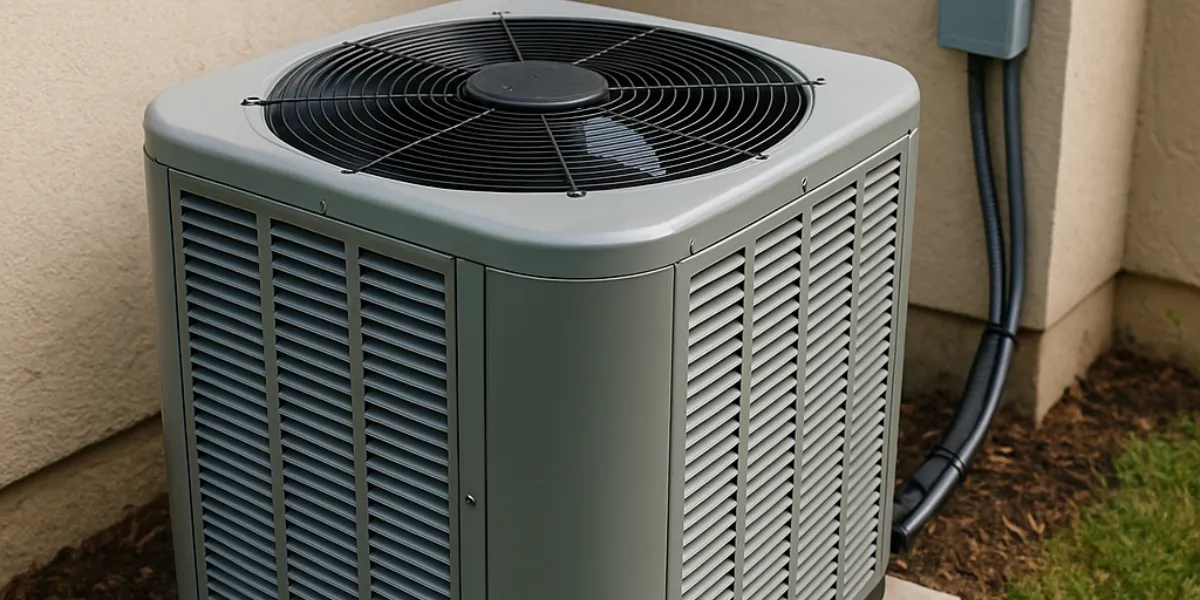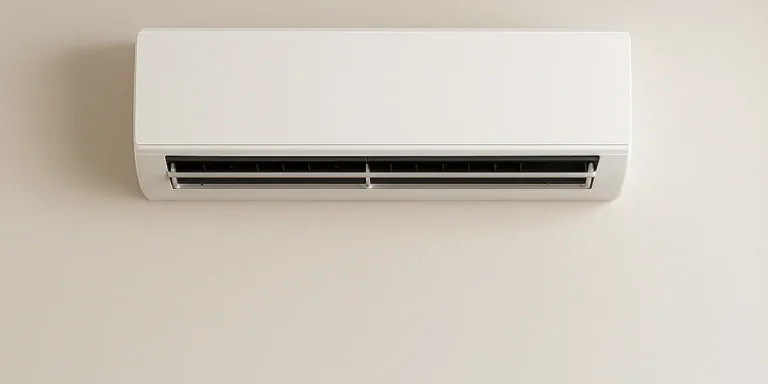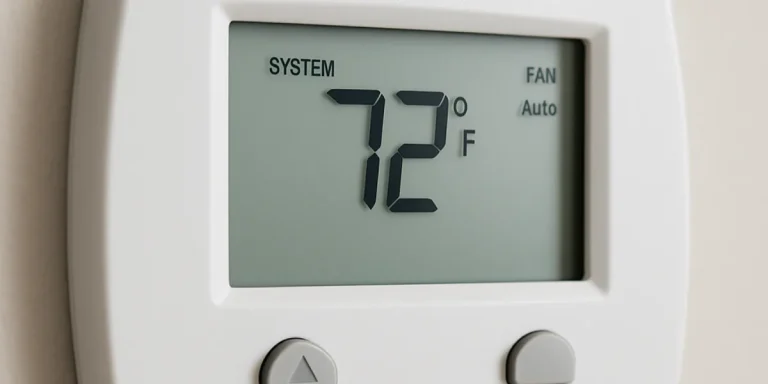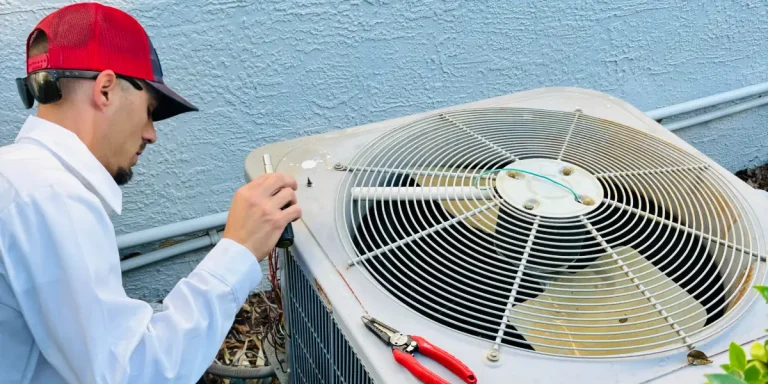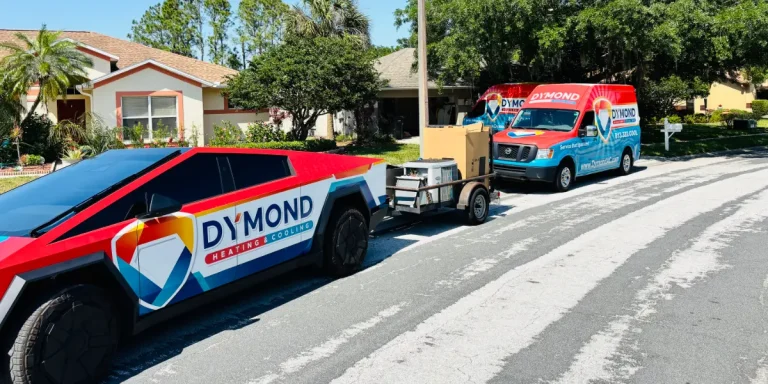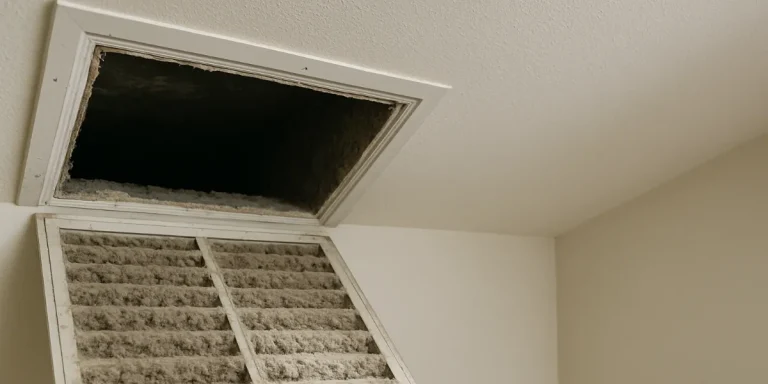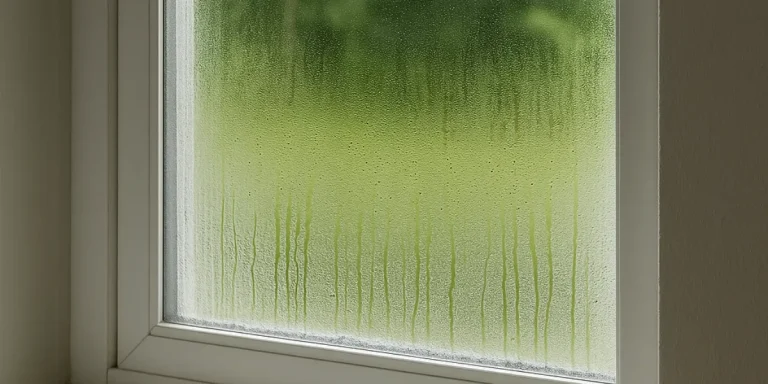Heat Pump Making Loud Noises? Here’s What to Check
A heat pump is designed to keep your Florida home comfortable all year long—quietly and efficiently. So when it suddenly starts making loud or unusual noises, it’s not just annoying—it could be a sign that something’s wrong.
At Dymond Heating & Cooling, we help homeowners throughout Pasco County troubleshoot and repair noisy heat pump systems. In this post, we’ll walk you through the most common causes of heat pump noise, what those sounds might mean, and when it’s time to call a professional.
Is your heat pump supposed to make noise?
Yes—but only a little. Heat pumps naturally produce a low humming or whooshing sound when operating, especially when switching between heating and cooling modes. However, banging, screeching, rattling, or buzzing are not normal and should be investigated.
Ignoring these noises can lead to bigger problems, including system breakdowns, reduced energy efficiency, or even damage to internal components.
Common Heat Pump Noises and What They Mean
Strange or loud noises coming from your heat pump can be more than just a nuisance—they’re often early warning signs that something is wrong. Ignoring them can lead to bigger, more expensive repairs down the road. Understanding what different sounds indicate can help you respond quickly and prevent further damage.
Here’s a breakdown of the most common heat pump noises and what they usually mean:
1. Banging or clanking
What it sounds like:
A loud, sudden metal-on-metal sound coming from the outdoor unit, especially when the system starts or stops.
What it could mean:
-
-
- Loose or broken fan blade: A bent or unbalanced fan blade can strike other internal components.
- Debris caught in the fan housing: Items like sticks, leaves, or even small stones can be pulled into the outdoor unit and hit the fan.
- Dislodged component inside the compressor: If an internal part has come loose, the noise may signal a serious mechanical failure.
-
What to do:
Turn off your heat pump and visually inspect the outdoor unit for obstructions. If you don’t see anything obvious, do not continue running the system. Call Dymond Heating & Cooling to schedule a professional diagnostic. Continued use may cause costly compressor damage.
2. Hissing or bubbling
What it sounds like:
A steady hissing or bubbling noise, typically near the refrigerant lines or indoor air handler.
What it could mean:
-
-
- Refrigerant leak: This is one of the most common causes of hissing in a heat pump. It reduces efficiency and can eventually damage the system.
- Pressure imbalance: Bubbling noises may signal air trapped in the refrigerant line, which disrupts pressure and cooling performance.
-
What to do:
Refrigerant problems are not a DIY fix—they require specialized tools and EPA-certified handling. The experts at Dymond Heating & Cooling can locate the leak, repair the damaged line, and recharge the refrigerant safely to restore proper operation.
3. Screeching or squealing
What it sounds like:
A high-pitched squeal or screech that may occur when the system starts up or while it's running.
What it could mean:
-
-
- Worn motor bearings: Bearings inside the blower or fan motor can degrade over time, creating friction and a loud screech.
- Failing fan motor or belt: If the motor or belt is deteriorating, you may hear squealing, especially during startup.
- Lack of lubrication: Friction between moving parts can produce these sounds when components aren’t properly maintained.
-
What to do:
These sounds often point to mechanical wear. Dymond Heating & Cooling can inspect the system, replace damaged components, and restore quiet, efficient operation.
4. Rattling or vibrating
What it sounds like:
A persistent rattling or vibrating noise coming from either the indoor or outdoor unit.
What it could mean:
-
-
- Loose panels or screws: Exterior panels may vibrate during operation if hardware has come loose.
- Unsecured refrigerant lines: Copper lines that aren’t properly fastened can rattle against walls or framing.
- Foreign objects: Leaves, twigs, or debris lodged against the unit can vibrate and create unwanted noise.
-
What to do:
Check that the panels on the unit are secure and that no debris is pressing against the exterior. If the noise continues, it may indicate an internal issue that requires attention from a licensed HVAC technician.
5. Buzzing or electrical humming
What it sounds like:
A low, continuous buzzing or humming sound, often heard near the compressor or control panel.
What it could mean:
-
-
- Electrical problems: Faulty capacitors, contactors, or relays inside the unit can create electrical buzzing sounds.
- Worn thermostat or loose wiring: A misfiring thermostat or corroded connections may also produce a subtle hum.
- Overloaded startup: If your heat pump struggles to start, the motor may buzz as it attempts to engage.
-
What to do:
Electrical issues should never be ignored, as they can lead to safety risks or system damage. Contact Dymond Heating & Cooling for a full electrical inspection and repair. We’ll ensure every component is functioning safely and efficiently.
If your heat pump is making any of these noises, don’t wait for the problem to get worse. Prompt inspection and service can save you money, reduce system wear, and help you avoid a full breakdown. The team at Dymond Heating & Cooling is here to help with fast, reliable heat pump repairs tailored to Florida’s climate and conditions.
Can You Fix a Noisy Heat Pump Yourself?
Some heat pump noises have simple causes—and in those cases, a little DIY effort may help. For example, if you hear a rattling sound, it could be as easy as tightening a loose panel screw or removing a small branch that’s wedged near the fan blades. Keeping the area around your outdoor unit clear of debris and trimming nearby vegetation can also reduce unnecessary vibration and airflow issues.
However, once the noise goes beyond something visible or surface-level, it’s best to leave the repairs to a professional. Here’s why:
-
- Internal components are complex: Sounds like screeching, buzzing, or hissing usually point to issues inside the unit—such as a failing motor, electrical fault, or refrigerant leak. These components require specialized tools and technical knowledge to repair properly.
- Safety risks are real: Heat pumps contain high-voltage electrical parts and pressurized refrigerant lines. Mistakes can lead to injury or further system damage.
- You could void your warranty: Most manufacturers require repairs and diagnostics to be completed by licensed HVAC professionals. Attempting a DIY fix could void important warranty coverage.
- Misdiagnosing the issue costs time and money: What seems like a loose fan blade might actually be a failing compressor mount. Guesswork can lead to multiple failed fixes and a bigger repair bill in the end.
When you call Dymond Heating & Cooling, you're getting more than just a quick repair—you’re getting peace of mind. Our licensed technicians are trained to:
-
- Accurately diagnose the source of unusual noises
- Pinpoint underlying causes rather than just symptoms
- Perform safe, lasting repairs that keep your heat pump operating quietly
- Recommend upgrades or maintenance if your system is aging or inefficient
We understand how Florida’s heat, humidity, and salt air can wear down HVAC systems faster than in other climates. That’s why we tailor every repair and service call to the specific needs of your home—and ensure your comfort system is working exactly as it should.
If your heat pump is making strange noises and you're unsure where to start, don’t risk a DIY repair. Let Dymond Heating & Cooling provide the professional support you need to restore comfort—and quiet—to your home.
How heat pump maintenance helps prevent noise
One of the best ways to avoid noisy operation is through routine maintenance. Our HVAC maintenance plans include comprehensive inspections that identify and correct potential issues before they become major problems.
Our heat pump tune-ups include:
-
- Cleaning and lubricating moving parts
- Inspecting and tightening electrical connections
- Checking refrigerant levels
- Verifying fan and motor performance
- Inspecting ductwork for leaks and vibration
With regular care, your heat pump will run more quietly, last longer, and save you money on energy bills.
Proudly serving Pasco County and beyond
Dymond Heating & Cooling provides expert heat pump service, repairs, and maintenance throughout:
Whether you're dealing with a loud unit or need a routine checkup, we're your trusted local HVAC partner.
Don’t ignore the noise—fix it fast
Loud heat pump? Let us take a closer listen. Strange sounds are often early warning signs of bigger problems—but with fast, professional service from Dymond Heating & Cooling, you can stop them in their tracks.
Call us today or schedule a service visit online to diagnose and repair your noisy heat pump. We proudly serve homeowners across Pasco, Hillsborough, and Hernando Counties, offering reliable solutions built for Florida homes.

